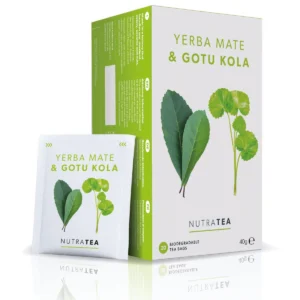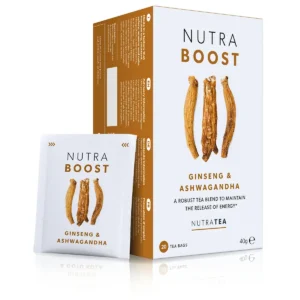Gotu Kola Supports Brain Health

Gotu Kola (Centella asiatica) enhances cognitive function, reduces anxiety, and supports circulation and wound healing. NutraTea herbalists crafted two tea blends that harness this amazing herb’s brain-healing, calming properties. Yerba Mate and Gotu Kola tea blend supports natural energy levels and cognition. 20% of the blend is Gotu Kola, which supports healthy circulation and tired legs. NutraBoost tea blend is carefully formulated to support physical, mental, and emotional health during times of exhaustion and depletion. NutraBoost contains Gotu Kola so your body can heal itself and you can stay level-headed and focused. In short, it’s the perfect tea for maintaining stamina when you’re tired.
Gotu Kola contains:
- Flavonoids
- Saponins
- Phenolic acids
- Amino acids
- Phytosterols
A Brain Tonic
Gotu Kola is undoubtedly a supreme herb at enhancing cognitive function. Several studies suggest that its triterpenoids improve memory, concentration, and mental clarity. This makes Gotu Kola a great brain tonic herb for people who strain their brain all day, every day, and for those experiencing cognitive decline or brain damage. It appears to stimulate neural pathways and protect against age-related confusion and memory problems. Gotu Kola increases the expression of mitochondrial and antioxidant response genes in the brain. It also increases synaptic marker expression in the hippocampus and frontal cortex. The most dramatic improvements in brain function appear in older people and people recovering from strokes who supplement with Gotu Kola. It appears to be an effective natural treatment for Alzheimer’s disease. For this reason, it’s considered a powerful longevity herb.
Lowers Anxiety
The herb can reduce anxiety and promote emotional well-being. Its calming effects are due to its ability to regulate neurotransmitters, especially gamma-aminobutyric acid (GABA), which helps modulate stress and anxiety responses. Consuming Gotu Kola regularly is necessary to see real improvement in anxiety levels. Still, it’s very promising as an alternative to conventional anxiolytics.
Improves Circulation
Additionally, Gotu Kola improves circulation and supports vascular health. Its saponins asiaticoside, madecassoside, and madasiatic acid empower it to treat chronic venous insufficiency, varicose veins, and other circulatory disorders. The herb strengthens the walls of blood vessels, reduces inflammation, and enhances blood flow, making it particularly useful for individuals experiencing swelling, heaviness, or discomfort in the legs due to poor circulation.

Supports Wound-healing
Gotu Kola famously supports skin health and wound healing. Its saponins stimulate collagen production, promote angiogenesis (the formation of new blood vessels), and enhance protective antioxidant activity in the skin. These effects make it effective for treating minor wounds, burns, and even stretch marks. It is often included in topical formulations for its skin-rejuvenating properties, and has been shown to improve elasticity and hydration in aging skin.
Meditation Herb
Gotu Kola is a perennial herb in the Apiaceae family. It is native to Asia and has been used for centuries in the traditional medicine systems Ayurveda and Traditional Chinese Medicine (TCM). Characterized by its small, fan-shaped green leaves and delicate pink or white flowers, the plant thrives in tropical and subtropical climates. It is odorless. You usually find it growing near sources of water. It is a low-growing ground cover with creeping stems that root at the nodes. All parts of the plant are used medicinally, but the leaves are the part most commonly harvested.
It’s also called Brahmi, Centella, Indian Pennywort, and Marsh Penny. In India, it is traditional to drink a cup of Gotu Kola tea before meditating. Often, the fresh leaves and stems appear in Asian cuisine, such as in Indian curry and one of Sri Lanka’s most popular dishes, Gotu Kola Sambol, which combines shredded Gotu Kola leaves, lime juice, shallots, chili, and grated coconut together.

Centella asiatica


